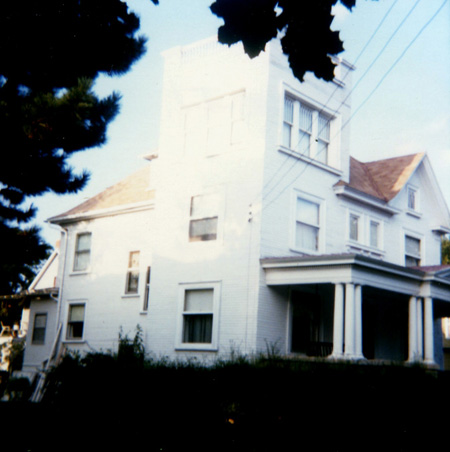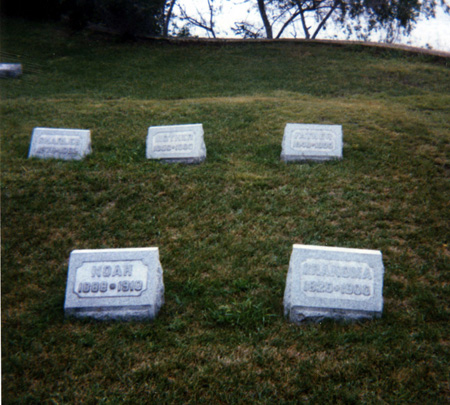Noah Cushman Perkins
1846-1900
by
Charlotte Carl-Mitchell

Front row: Mary Allen
Swift Perkins and Maj.
Noah
Cushman Perkins
Back row: Noah Cushman Perkins, Jr.,
Lothrop
Perkins
Noah Cushman
Perkins,
Jr. was born on 20 Sep 1846 in Rochester, MA, the son of Maj. Noah C.
Perkins
and

A close-up of Noah from the group photo
Noah was
active
in
business and civic affairs. According to his obituaries in the Ottawa
newspaper, he worked at first as a clerk in Gridley's general store,
later in the Phipps
shoe store. He then ran a knitting factory in a building where the city
offices
eventually were located, and later was manager of the gas company.


A photo of Noah and his brother
Lothrop
Perkins,
with a close-up of Noah
Noah
married
Georgianna
Clara Beckwith on 19 Oct 1870.


They
had seven
children,
four of whom survived: Charles Cushman, Mary Frank, Mercy Briggs and
Noah
Cushman Perkins.

Noah
was an
active
member of the Ottawa volunteer fire department.


Above, Noah Cushman Perkins’ volunteer
fire
brigade.

Above
is a
close-up
of Noah from the group photo. This image of him shows him at the oldest
age
of the few photos we have of him. Surprisingly, we have more photos of
his
brother, Lothrop than of him!
From
1 February 1892 until his death he was in the drug business with
William D. Duncan,
their store being located at 717 LaSalle Street. Noah died of Bright's
disease
(or chronic interstitial nephritis) on 10 September 1900 in Ottawa,
just
10 days short of his 54th birthday. At the time of his death he was a
member
of the Democratic Town Central Committee, the Ottawa Fire Department,
the
Knights of Pythias and the Modern Woodmen of America. He was a charter
member
of and the first banker of local camp, No. 3, M.W.A.
According
to its website, the Knights of Pythias is one of the oldest fraternal
organizations
in North America, founded in 1864 during the strife of the Civil War,
and dedicated to universal peace and goodwill and the practice of
Friendship,
Charity and Benevolence. According to its website, Modern Woodmen of
America
was founded in 1883 as a fraternal insurance society designed to
provide
financial security to families from all walks of life.

According
to one
obituary,
Noah only held one public office, that of assistant supervisor. He was
appointed
in 1892 to fill a vacancy and was reelected regularly after that. “He
was
well liked on the board and was a good man for Ottawa on it.” In
another obit,
he was described as “a stalwart Democrat, and was frequently urged to
allow
his party to present his name before conventions of his party, but it
was
only on one occasion that he consented and then it was too late in the
campaign,
pledges having previously been made to another. But Mr. Perkins did not
sulk.
He was in the fight for the ticket just as earnestly as though his own
name
had been placed there. He was a man of more than average intelligence
and
business acumen and a man of positive opinions, yet liberal in spirit
and
kind at heart. He had large interests aside from his drug business. His
death
has removed from Ottawa one of its prominent figures.”
He must have been
a
wealthy man because at his death he left a considerable estate. A
letter
to Mercy Perkins in 1908 stated that the balance of her inheritance was
$11,726.14
which in today's money would be $234,520. He also said that if she
would
save $10,000 and use only the income, she would never have occasion to
want. If each of the four children received almost a quarter of a
million dollars
(equivalent), that would mean his estate had to have been worth almost
a
million in current dollars.
Noah
may have been
well
liked by his colleagues and peers, but at least one of his daughters
didn’t
like him. In Grandma Ramsey’s letters she talked frequently about how
much
she disliked her father and the entire Perkins clan. Everything he did,
she
seemed to want to do the opposite. Her
father
had been a Democrat so therefore she considered herself a Republican.
She
was so estranged from her Perkins relatives that for years she refused
to
visit her Aunt Emily Perkins, her Uncle Lothrop's widow, when she
returned
to Ottawa. She relented though and did see her aunt before Emily's
death
in 1907. Mercy also admitted that she was like her father, but that
Mary was their father's favorite of the two girls and Noah before her.
Also
in Mercy's
letters,
she said her family lived in a fine house without any cares.

The photo above was taken by David Cate during a trip to Ottawa.
They were obviously wealthy enough to have servants do all the
work
around
the house because Mercy admitted not being able to cook or sew. She was
also
used to having her clothes custom made. Pictures of Georgia show her in
lovely
clothes and jewels, but she seems very melancholy. She may have had an
unstable
personality, but if Mercy's comments are correct, she may also have
been
abused mentally or physically by her husband. Mercy loved her mother
and
hated her father and for a while all men. There must have been a reason
for
that.
The
Beckwith/Perkins
families suffered terrible losses in 1900. Within a three-month period,
Georgia’s
mother, husband and sister died. Noah’s death pushed her over the edge
and
after being declared legally insane by the courts and sent to a
sanitarium,
Georgia committed suicide, leaving her four children orphans. Noah
Cushman
Perkins was buried in the Perkins plot in the Ottawa cemetery along
with
his wife, mother-in-law and two sons, Charles and Noah, both of whom
died
soon after him, Charles of TB in 1902 and Noah of Typhoid in 1910.
